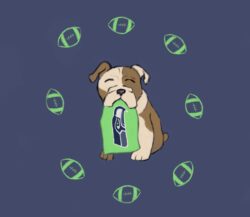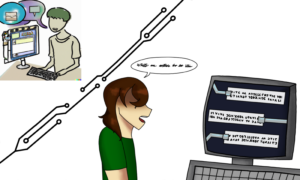When Georgetown students walked into their classrooms during the first week of school, many were met with a surprise: professors going no-tech. As students went to pull out their laptops and tablets to take notes, some professors informed them that devices would not be allowed throughout the course.
With the rise of artificial intelligence (AI), more Georgetown professors are opting to enforce no-technology policies this fall. This rule forces students to return to old-school ways, taking paper notes and in-class, handwritten exams.
At the same time, some professors are finding ways to incorporate AI into their assignments, recognizing the increasingly prominent role the tool is playing in our society.
A rise in old-school notetaking
Erika Seamon, a professor in the American Studies Program, has been embracing no-tech classrooms for years. Seamon believes that eliminating technology limits the number of distracting tasks students could be doing, allowing them to focus on the subject at hand.
With no computer and no access to the news, email, Wordle, or any of the other activities students do in class, they are instead forced to pay attention and engage with the content.
“When it is not an option to do a little studying for the Spanish exam that’s coming up and it is not an option to quickly reply to an email, they can try to be present to listen, think, and engage,” Seamon wrote.
Seamon doesn’t believe that Georgetown students are maliciously using their computers in class, rather she finds that they struggle to ignore all of their other responsibilities when they have access to technology.
“They feel that they should be studying for the language test that’s in an hour or that they should send this one email because they’ve kept others waiting,” Seamon wrote to the Voice. “Having students avoid laptops, tablets, and phones during class allows them to put the ‘shoulds’ aside for 75 minutes.”
Like Seamon, Joseph Hartman, Walter I. Giles Associate Professor of the Practice in Constitutional Law, has had a no-tech policy in his classes for several years, limiting students to tablets with a stylus pen.
Hartman initially got the idea to prohibit laptops as a teaching assistant in his graduate program. At the professor’s request, Hartman sat in the back of the class and looked at the screens of all the students.
“Of course, people were surfing the internet,” Hartman said. “It confirmed what we both thought, which was if people have access to devices, it’s a natural temptation when things run a little slow in the classroom to jump online.”
Making students more engaged
According to Hartman, when students write notes by hand, they also learn the material better. Rather than mindlessly typing everything the professor says, students have to selectively and consciously choose what information to write. Handwriting increases the chance that they will retain the information later on.
“The physical act of writing—there’s something more embodied, that your brain and body are connected a little bit more,” Hartman said. “You learn better by having to do that, even though it’s more difficult.”
Some students have noticed that they are more focused in tech-free classes.
Hartman believes that students are more engaged in classes with no-tech policies. Some students have noticed this as well.
“You also see that everybody else in the class is also remaining much more focused, which is nice, because there’s more participation and engagement and just genuinely feels more like a classroom environment,” Siddharth Krishnan (CAS ’28) said.
Not a perfect solution
Paper-only classes do come with their own challenges that can impact a student’s ability to learn. Many professors post readings online, so students in no-technology courses may need to print out their readings to bring them to class. At Georgetown, finding a printer with paper and ink can often be a hassle, forcing students to search for a printer before class, Krishnan said.
Other students face challenges writing down all the information from the professor.
“Sometimes when professors are speaking super fast and it’s a lot of information, it’s kind of hard to take notes on paper,” Merel Halfhide (CAS ’27) said. “It’s easier to use my laptop.”
Handwritten exams return
Handwritten notes aren’t the only hallmark of a no-tech class. More professors are opting to eliminate research or take-home papers, citing concerns around the use of AI. Instead, some professors are choosing to administer handwritten bluebook exams.
In the past, Hartman’s classes have had take-home exams. However, this year, he decided to do an in-class final exam, citing concerns over student’s use of AI on papers.
Like Hartman, Marc Howard, professor of government and law and director of the Prisons and Justice Initiative, has also chosen to do an in-person, closed-book midterm this semester, following the usual format of his final exam.
Howard’s changes to exam formats stem Howard professors’ struggles to determine if a student’s work is genuine or assisted by AI programs such as ChatGPT or Google Gemini.
“I just realized that I wouldn’t be able to properly and objectively and fairly assess who did what on their papers the way the assignment was structured. So I got rid of that assignment,” Howard said.
Howard has additionally chosen to add a no-phone policy to his class.
“People have their phones at their desk or in their laps and are constantly sort of peeking at their phones,” Howard said. “So I decided based on my own assessment of my classroom, but also based on research.”
“Part of our world”
Other professors are embracing technology and AI in their courses. Cal Newport, professor of computer science, is one of them. At Georgetown, Newport believes there are ways that AI can be incorporated in the classroom outside of technology-related courses.
“If, say, certain AI tools are becoming indispensable in academic Art History, then a student studying Art History should be exposed to these tools and how they work,” Newport wrote to the Voice.
Georgetown isn’t choosing to completely ignore AI, creating task forces and centers such as the Center for New Designs in Learning and Scholarship. The center helps faculty understand how these tools can be used in the classroom.
Newport serves on the University’s Task Force for Pedagogical Uses of AI, who found that AI tools can be used differently in each classroom, with innovative uses for specific learning goals, depending on the course. The existence of the task force highlights that AI tools aren’t limited to assistance with papers or readings.
When thinking about how technology should or shouldn’t be used, Newport believes digital minimalism is most appropriate.
“Technology should serve things you care about. You should work back from your values, and ask how technology can support them. Then feel confident to not use anything that’s not a part of these answers,” Newport wrote.
Mark Fisher, assistant professor in the government department, has encouraged the use of AI tools in his courses to help students during the writing process. However, he said that he doesn’t support the idea of AI being the only tool that students use to understand course material.
“I think with undergraduate classes where they’re writing a lot, I don’t try to police their use of AI, but I do ask them to talk about their writing a ton in class,” Fisher said.
Fisher said that by talking to students about their writing, he’s able to ensure they’re actively involved in the writing process, even if they may use AI to help them.
Despite the common belief that students use AI to cheat or as a substitute for writing their own papers, Fisher thinks this doesn’t apply to most students at Georgetown. According to Fisher, some students are reluctant to use any kind of AI because they believe they may be accused of cheating.
“There was a lot of discussion a couple of years ago of professors really thinking that students were trying to cheat the system and use AI to kind of shirk their duties. I haven’t seen any of that with our students,” Fisher said.
Fisher believes there should be a balance between what AI can and cannot be used for. He thinks it’s important for students to engage with AI for some assignments, but not all. Fisher mentioned that AI isn’t going away and is constantly changing, so acknowledging its existence in higher education is important.
“I don’t think it’s an unmitigated good or bad,” Fisher said. “We have to be really intentional about how we use AI. I very much do think it’s going to be part of our world, so trying to pretend that it’s not is not helpful.”
Right now, he believes there is a lot of uncertainty about what’s next for the future of AI and how Georgetown professors will respond to the continuing evolution of this tool.
“We’re kind of in a moment where things are changing so rapidly that it’s hard to know semester by semester what the best way forward is,” Fisher said.
Students grapple with AI and no-tech policies
Some students agree with Fisher and believe that blanket policies prohibiting AI aren’t necessarily beneficial for students.
“It’s kind of inevitable, and I think it’s better for professors to make rules about how to use it in a proper way, than to say, ‘You can’t use it at all,’ because people are going to use it,” Halfhide said.
Halfhide and Krishnan both said they have used AI in the past but have personally chosen to use it much less now.
While Krishnan does not use AI due to its negative impacts on the environment and marginalized communities, Halfhide emphasized the importance of their education and a desire to do the hard work without assistance.
“I try not to use it too much. I feel like I’m here for my education, so I need to develop my own critical thinking,” Halfhide said.
For Krishnan and Halfhide, some no-tech classes can serve as a space where students are empowered to make the most of their education at Georgetown.
“It also just reminds students of the fact that you can do work and you can have education without AI,” Krishnan said.






